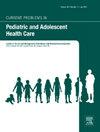癌症幸存者的PCP
IF 3.7
4区 医学
Q1 PEDIATRICS
Current Problems in Pediatric and Adolescent Health Care
Pub Date : 2025-08-01
DOI:10.1016/j.cppeds.2025.101823
引用次数: 0
摘要
在美国,儿童癌症幸存者(CCS)的数量超过50万,并且还在继续上升。虽然复发风险随着时间的推移而降低,但癌症治疗的晚期效应随着年龄的增长而增加,影响超过60%的幸存者。初级保健提供者(pcp)在管理CCS的长期健康需求方面处于理想地位,但由于缺乏简明的指导方针,许多人感到装备不足4,5。本文提供了pcp在CCS中管理后期效应的全面概述。重点领域包括一般健康维护、心理和神经认知护理、免疫功能和疫苗接种,以及内分泌、心血管、肺部和继发性恶性肿瘤的监测。重点是定期检查和改变生活方式。我们提倡积极主动的PCP参与监测和管理与儿童癌症治疗相关的晚期效应。本文章由计算机程序翻译,如有差异,请以英文原文为准。
Cancer survivorship for the PCP
The number of childhood cancer survivors (CCS) in the United States exceeds 500,000 and continues to rise1. While recurrence risk diminishes over time, the prevalence of late effects from cancer treatment increases with age and affects over 60% of survivors2, 3. Primary care providers (PCPs) are ideally positioned to manage the long-term health needs of CCS, yet many feel ill-equipped due to a lack of concise guidelines4, 5. This article provides a comprehensive overview for PCPs on managing late effects in CCS. Key areas of focus include general health maintenance, psychological and neurocognitive care, immune function and vaccinations, as well as monitoring for endocrine, cardiovascular, pulmonary, and secondary malignancies. Emphasis is placed on regular screenings and lifestyle modifications. We advocate for proactive PCP involvement in the surveillance and management of late effects associated with childhood cancer treatment.
求助全文
通过发布文献求助,成功后即可免费获取论文全文。
去求助
来源期刊
CiteScore
4.60
自引率
0.00%
发文量
61
审稿时长
5 days
期刊介绍:
Recognized for its probing, comprehensive, and evidence-based reviews, Current Problems in Pediatric and Adolescent Health Care devotes each issue to a timely and practical topic in pediatric medicine, presented by leading authorities in the field. The journal offers readers easily accessible information that enhances professional experience and is pertinent to daily pediatric practice. Each issue''s review article is accompanied by an additional special feature designed to highlight a particular aspect of the topic presented.

 求助内容:
求助内容: 应助结果提醒方式:
应助结果提醒方式:


